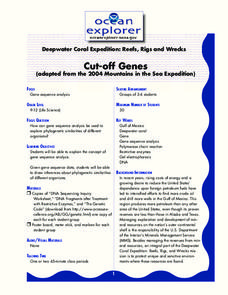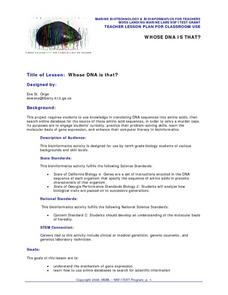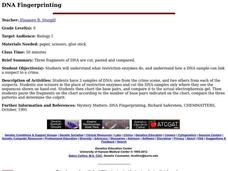Curated OER
Genes
Students explore the history, inheritance and mutations of genetics. In this genetic lesson students complete experiments on DNA sequences.
Curated OER
Enhancing Students' Problem-Solving Abilities
Young scholars analyze the results of a hypothetical cloning experiment using a restriction endonuclease map obtained from an on-line data source. They answer the question, "How can I tell if the DNA I have obtained from this...
Curated OER
Cut-Off Genes
Learners explain the concept of gene sequence analysis. In this gene instructional activity, students draw inferences about phylogenetic similarities of different organisms.
Curated OER
Polymerase Chain Reaction (PCR)
Students explore how PCR works through various activities. In this biology lesson, students explain how PCR generate copies of DNA. They simulate the process using an online interactive website.
Curated OER
Gel Electrophoresis
Students conduct a variety of experiments to explore gel electrophoresis. In this biology lesson, explain how this process separate DNA and RNA. They discuss the practical applications of this method.
Curated OER
The Human Genotype
Six different chromosome activites introduce biology aces to heredity, chromosomal abnormalities, sex-linked traits, and the human genome. The hands-on activites are fairly simple for the teacher to prepare and will prove to be both...
Curated OER
Science Lesson: Chocolate Flavored Cherries
Students are able to identify start and stop sequences in DNA. They are able to model using restriction enzyme and ligase to remove sections of DNA and reattach them. Students are introduced to the process of recombinat DNA through the...
Curated OER
Games and Activities to Teach Molecular Genetics
Students demonstrate a working knowledge of cell interactions such as DNA replication, protein synthesis (transcription and translation), through active participation in a cooperative group.
Curated OER
Comparing mtDNA Sequences to Learn about Human Variation
This computer-based lesson will enable students to test their notions of "racial" similarity and difference by comparing mtDNA sequences as the students do in the first episode of RACE - The Power of an Illusion.
Curated OER
Genetic Analysis
Students formulate a hypothesis regarding the validity of the current status of the Arizona Hedgehog cactus as a distinct variety of cactus. They design a procedure to isolate DNA from the tissue of plants, given a list of chemicals and...
Curated OER
Protein Synthesis Activities
Students participate in a teacher-guided activity to teach about protein synthesis. Student roles include one person as the DNA molecule, another is a single stranded sequence of complementary mRNA.
Curated OER
Proteins from Plants to People
Students participate in a scientific activity to identify the building blocks for proteins (amino acids) that are needed to grow. They identify foods that contain proteins, how they are digested and rearrange the building blocks. They...
Curated OER
Forensic Files
Students create a model of DNA and relate it to the differences between individual people in their nitrogen base sequences. They analyze a crime scenario in which they perform several different types of tests.
Curated OER
Create A DNA Fingerprint
Students engage in a lesson that is about the DNA molecule and focuses upon the sequencing of proteins to identify individuals. They conduct research using a variety of resources and then complete the activities included in the 3 parts...
Curated OER
DNA Blueprint for Life
Students isolate DNA from different food sources. For this biology lesson, students research DNA extraction. They analyze DNA stands collected from the lab, and compare the differences between each.
Curated OER
Molecular Evidence for Evolutionary Relationships
Students compare the amino acid sequences in cytochrome-c for a variety of organisms and use this information to infer evolutionary relationships. They investigate the role of homeobox genes and what this indicates about the evolution of...
Curated OER
Whose DNA Is That?
Learners investigate the use of technology in order to identify different sequences of amino acids by using online web tools. They enhance problem solving skills with amino acid identification skills and strengthening comfort with using...
Curated OER
Comparison of Four-, Six-, And Eight-bp Cuts in Calf Thymus Dna
Students investigate the use of restriction enzymes to recognize a four-, six-, and eight-nucleotide sequence. They utilize restrictive endonucleases to cut Thymus DNA and compare results by viewing the DNA fragments on Agarose Gel...
Curated OER
DNA Fingerprinting
Ninth graders investigate what restriction enzymes do, and explain how a DNA sample can link a suspect to a crime.
Beyond Benign
What is Biotechnology
Examine the sequence of key events in the history of genetics. An engaging lesson asks scholars to sort events to create a timeline of biotechnology milestones. Arranging the events gives learners a perspective on the development of...
Curated OER
How Mutations Lead to Changes in Cell Structure and Function
High schoolers investigate how mutations lead to changes in cell structure and function. They construct an oligonucleotide, identify a protein sequence, design a step-by-step mechanism of how they think cells repair damaged DNA, and...
Curated OER
What Can Pseudogenes Tell Us About Common Ancestry?
Students compare/constrast DNA sequence data for a portion of the rat GULO gene to the corresponding sequence in the inactive GULO gene in humans, chimpanzees, orangutans, and crab-eating macaques by identifying the shared sequences in...
Curated OER
Adaptations of Fishes for Survival in Polar Environments
High schoolers compare the anatomy of temperature and polar fishes. They explore the adverse effects of cold on metabolism and physiology and discuss how polar fishes adapt to their environments. Comparisons are also made to the DNA...
Curated OER
BLAST Algorithm
Students explore a series of activities on using BLAST. In this biology lesson plan, students explain the significance of BLAST in DNA query. They give real world applications of BLAST.























